Business
World awaits landmark US Supreme Court decision on Trump’s tariffs
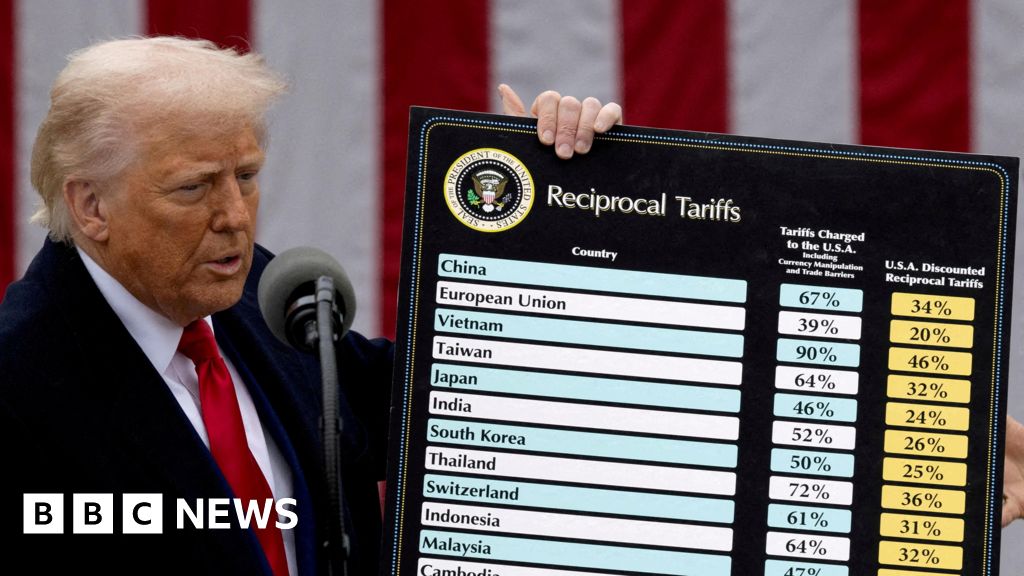
Natalie ShermanBusiness reporter
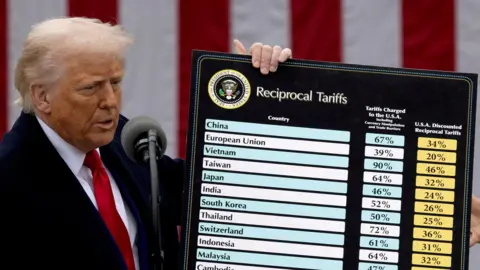 Reuters
ReutersWhat may be the biggest battle yet in Donald Trump’s trade war is about to begin.
The Trump administration heads to the US Supreme Court on Wednesday, facing off against small businesses and a group of states who contend most of the tariffs it has put in place are illegal and should be struck down.
If the court agrees with them, Trump’s trade strategy would be upended, including the sweeping global tariffs he first announced in April. The government would also likely have to refund some of the billions of dollars it has collected through the tariffs, which are taxes on imports.
The final decision from the justices will come after what could be months of poring over the arguments and discussing the merits of the case. Eventually they will hold a vote.
Trump has described the fight in epic terms, warning a loss would tie his hands in trade negotiations and imperil national security.
On Sunday, the president said he will not attend the hearing in person as he did not want to cause a distraction.
“I wanted to go so badly… I just don’t want to do anything to deflect the importance of that decision,” he said. “It’s not about me, it’s about our country.”
Trump previously said that if he does not win the case the US will be “weakened” and in a “financial mess” for many years to come.
The stakes feel just as high for many businesses in the US and abroad, which have been paying the price while getting whipped about by fast-changing policies.
Trump’s tariffs will cost Learning Resources, a US seller of toys made mostly overseas and one of the businesses suing the government, $14m (£10.66m) this year. That is seven times what it spent on tariffs in 2024, according to CEO Rick Woldenberg.
“They’ve thrown our business into unbelievable disruption,” he said, noting the company has had to shift the manufacturing of hundreds of items since January.
Few businesses, though, are banking on a win at the court.
“We are hopeful that this is going to be ruled illegal but we’re all also trying to prepare that it’s setting in,” said Bill Harris, co-founder of Georgia-based Cooperative Coffees.
His co-op, which imports coffee from more than a dozen countries, has already paid roughly $1.3m in tariffs since April.
A test to Trump’s presidential power
In deciding this case, the Supreme Court will have to take on a broader question: How far does presidential power go?
Legal analysts say it is hard to predict the justices’ answer, but a ruling siding with Trump will give him and future White House occupants greater reach.
Specifically, the case concerns tariffs that the Trump administration imposed using the 1977 International Emergency Economic Powers Act (IEEPA), which the White House has embraced for its speed and flexibility. By declaring an emergency under the law, Trump can issue immediate orders and bypass longer, established processes.
Trump first invoked the law in February to tax goods from China, Mexico and Canada, saying drug trafficking from those countries constituted an emergency.
He deployed it again in April, ordering levies ranging from 10% to 50% on goods from almost every country in the world. This time, he said the US trade deficit – where the US imports more than it exports – posed an “extraordinary and unusual threat”.
Those tariffs took hold in fits and starts this summer while the US pushed countries to strike “deals”.
Opponents say the law authorises the president to regulate trade but never mentions the word “tariffs”, and they contend that only Congress can establish taxes under the US Constitution.
They have also challenged whether the issues cited by the White House, especially the trade deficit, represent emergencies.
Members of Congress from both parties have asserted the Constitution gives them responsibility for creating tariffs, duties and taxes, as well.
More than 200 Democrats in both chambers and one Republican, Senator Lisa Murkowski, filed a brief to the Supreme Court, where they also argued the emergency law did not grant the president power to use tariffs as a tool for gaining leverage in trade talks.
Meanwhile, last week the Senate made a symbolic and bipartisan move to pass three resolutions rejecting Trump’s tariffs, including one to end the national emergency he declared. They are not expected to be approved in the House.
Still, business groups said they hoped the rebuke would send a message to the justices.
‘An energy drain like I’ve never seen’
Three lower courts have ruled against the administration. After the Supreme Court hears arguments on Wednesday it will have until June to issue its decision, although most expect a ruling to come by January.
Whatever it decides has implications for an estimated $90bn worth of import taxes already paid – roughly half the tariff revenue the US collected this year through September, according to Wells Fargo analysts.
Trump officials have warned that sum could swell to $1tn if the court takes until June.
 Cafe Campesino
Cafe CampesinoIf the government is forced to issue refunds, Cooperative Coffees will “absolutely” try to recoup its money, said Mr Harris, but that would not make up for all the disruption.
His business has had to take out an extra line of credit, raise prices and find ways to survive with lower profits.
“This is an energy drain like I’ve never seen,” said Mr Harris, who is also chief financial officer of Cafe Campesino, one of the 23 roasteries that own Cooperative Coffees. “It dominates all the conversations and it just kind of sucks the life out of you.”
What could happen next?
The White House says that if it loses, it will impose levies via other means, such as a law allowing the president to put tariffs of up to 15% in place for 150 days.
Even then, businesses would have some relief, since those other means require steps like issuing formal notices, which take time and deliberation, said trade lawyer Ted Murphy of Sidley Austin.
“This is not just about the money,” he said. “The president has announced tariffs on Sunday that go into effect on Wednesday, without advance notice, without any real process.”
“I think that’s the bigger thing for this case for businesses – whether or not that is going to be in our future,” he added.
There is no clear sign of how the court will rule.
In recent years it has struck down major policies, such as Biden-era student loan forgiveness, as White House overreach.
But the nine justices, six of whom were appointed by Republicans, including three by Trump, have shown deference to this president in other recent disputes and historically have given leeway to the White House on questions of national security.
“I really do think arguments are available for the Supreme Court to go in all different directions,” said Greta Peisch, partner at Wiley and former trade lawyer in the Biden administration.
Adam White, senior fellow at the American Enterprise Institute, said he expected the court to strike down the tariffs, but avoid questions like what constitutes a national emergency.
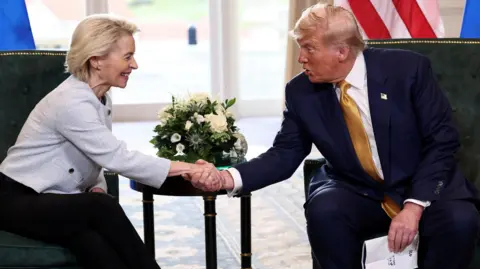 Reuters
ReutersThe case has already complicated the White House’s trade deals, such as one struck in July with the European Union.
The European Parliament is currently considering ratifying the agreement, which sets US tariffs on European goods at 15% in exchange for promises including allowing in more US agricultural products.
“They’re not going to act on this until they see the outcome of the Supreme Court decision,” said John Clarke, former director for international trade at the European Commission.
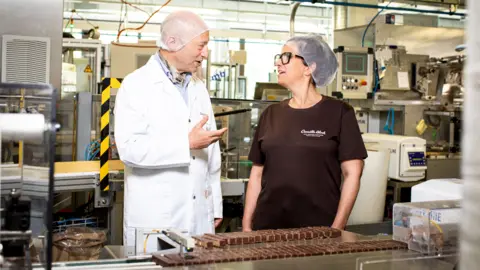 Chocolats Camille Bloch
Chocolats Camille BlochIn Switzerland, which recently downgraded its outlook for economic growth citing America’s 39% tariff on its goods, chocolatier Daniel Bloch said he’d welcome a ruling against the Trump administration.
His business Chocolats Camille Bloch is absorbing about a third of the cost of new tariffs on kosher chocolate that his firm has exported to the US for decades, aiming to blunt price increases and maintain sales. That decision has wiped out profits for the unit and is not sustainable, he said.
He hopes Trump will reconsider his tariffs altogether, because “that would be easiest”.
“If the court were to make the tariffs go away of course we would see that as a positive sign,” he said. “But we don’t trust that that will bring the solution.”
Business
Trade deal done, says Trump; PM Modi thanks him for cutting tariff to 18% – The Times of India

NEW DELHI/ WASHINGTON: After months of bruising trade tensions, India and the US on Monday announced a bilateral trade deal that will see Washington slash additional tariffs on Indian imports to 18%, from the current 50%, making it more competitive for textiles, leather and seafood exporters.While PM Narendra Modi, in a post on X, which followed US President Donald Trump’s announcement on Truth Social, said he had a wonderful conversation with “dear friend” Trump and thanked him on behalf of 1.4 billion people for the reduced tariff of 18% on Indian goods, he did not mention the trade deal at all in his post on X that followed Trump’s “wonderful” announcement.
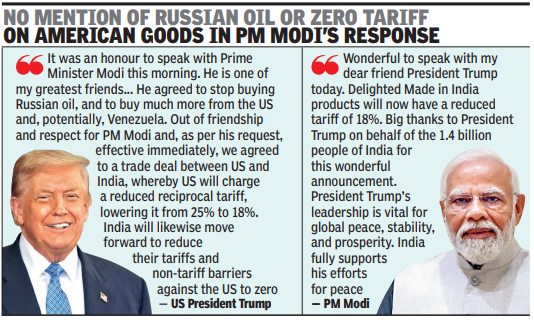
PM Modi and Trump
Modi also did not comment on Trump’s claim that in their conversation the PM had agreed to stop buying Russian oil and purchase much more energy from the US, and potentially Venezuela. Trump had said Modi had agreed to stop buying Russian oil and to buy much more from the US — $500 billion of energy, technology and farm products — a step that the President claimed would help end the war in Ukraine.According to the American President, Modi also agreed to bring down tariff and non-tariff barriers against the US to zero. A US embassy spokesperson confirmed that the final tariff now on India is 18%, down from the earlier 50%. This is a better deal for India than countries such Vietnam, Bangladesh, Indonesia, South Korea and China, which face higher tariffs. The Trump-Modi conversation coincided with the visit of EAM S Jaishankar to US for a critical minerals ministerial that will be chaired by Secretary of State Marco Rubio this week.The announcement came six days after India and the EU announced the completion of talks for a comprehensive trade agreement.Trump leadership vitalfor global peace: ModiThe deal had drawn sharp comments from some members of the Trump administration, including attacks on the EU.In his X post, PM said, “When two large economies and the world’s largest democracies work together, it benefits our people and unlocks immense opportunities for mutually beneficial cooperation”. He added that Trump’s leadership was vital for global peace, stability, and prosperity. India fully supports his efforts for peace. Modi said he was looking forward to working closely with Trump to take the partnership to unprecedented heights.Apart from reciprocal tariff, Trump had announced an additional 25% tariff on India for its purchase of Russian oil.Trump said the US had agreed to the trade deal with India out of friendship and respect for Modi, and at the latter’s request. “Our amazing relationship with India will be even stronger going forward. PM Modi and I are two people that GET THINGS DONE, something that cannot be said for mos,” he added.Trump in his social media post also said that it was an honour to speak with Modi whom he described as “one of my greatest friends and, a Powerful and Respected Leader of his Country”.
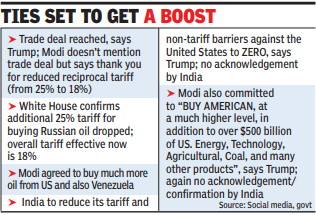
Ties set to get boost
While the US had acknowledged in past few months that India had cut down its Russian purchase, it had not eliminated the additional tariff.Trump also said, “We spoke about many things, including Trade, and ending the War with Russia and Ukraine. He agreed to stop buying Russian Oil, and to buy much more from the US and, potentially, Venezuela. This will help END THE WAR in Ukraine, which is taking place right now, with thousands of people dying each and every week!”Following the announcement last week of the successful conclusion of FTA negotiations with EU, India had suggested that India and US might be close to finalising the trade agreement they have been discussing since Feb last year.Trump’s disclosure of the trade deal was preceded by two India-related posts a few hours before, one of which featured him and Modi on a magazine cover with the caption “The Mover and the Shaker”. Another post featured New Delhi’s India Gate, which Trump called “India’s beautiful Triumphal Arch” and said, “Ours will be the greatest of them all!” — referring to a similar monument he wants to build in Washington DC.
Business
New York AG issues warning around prediction markets ahead of Super Bowl

New York Attorney General Letitia James speaks to the media, after she attended a hearing and pleaded not guilty to charges that she defrauded her mortgage lender, outside the U.S. District Court for the Eastern District of Virginia, in Norfolk, Virginia, U.S., Oct. 24, 2025.
Jonathan Ernst | Reuters
Days before Super Bowl 60, New York Attorney General Letitia James has a message for consumers: Be careful about placing trades on prediction markets.
“New Yorkers need to know the significant risks with unregulated prediction markets,” James said in a statement Monday. “It’s crystal clear: so-called prediction markets do not have the same consumer protections as regulated platforms. I urge all New Yorkers to be cautious of these platforms to protect their money.”
Prediction platforms like Kalshi and Polymarket are expected to generate billions of dollars in trading volume around the Super Bowl.
Consumers can make trades on game events — similar to online sportsbooks like DraftKings or FanDuel — as well as on predetermined outcomes, such as which companies will advertise during the Super Bowl, an issue CNBC Sport reported on last week.
James said the platforms’ products are bets “masquerading” as event contracts.
She warned there are concerns about the nascent prediction market industry, including “upholding prohibitions against insider betting and requiring regulatory review to ensure the financial stability and integrity of gambling operators.”
“Prediction markets may appear as modern, high-tech platforms for speculation or ‘forecasting,’ but in practice, many operate as unregulated gambling without the basic protections New York consumers both deserve and expect from properly licensed operators,” James said in the statement.
Prediction market contracts trade somewhat similarly to all-or-nothing options, with contracts priced between $0 and $1. The contracts trade up or down depending on the action.
In addition to contracts on Super Bowl commercials, both Polymarket and Kalshi are offering other trades related to the game, including on matters like “What songs will be played at the halftime show?,” “Who will attend the big game?,” and more traditional sportsbook “bets” such as “Seattle vs. New England: Most Rushing Yards,” as CNBC reported last week.
There are laws that prohibit insider trading on prediction markets, just as on traditional financial markets. But industry experts say they’re skeptical that the Commodity Futures Trading Commission, recently gutted as part of widespread government cuts, has the will or the means to police those problems.
Last week, CFTC Chairman Michael Selig said he had directed agency staff to withdraw a proposed rule that would have banned prediction trades on sports and politics. He said new rules would be coming.
Disclosure: CNBC has a commercial relationship with Kalshi.
Business
India-US trade deal: 25% penal tariffs linked to Russian oil gone? Here’s what we know – The Times of India

US President Donald Trump has reportedly agreed to remove the 25% tariff America imposed on India for its crude oil imports from Russia. A New Delhi–based source quoted in a Bloomberg report said that the US has agreed to withdraw the 25% penal tariff for India’s Russian oil procurement. In the meantime, India and the US have announced a trade deal, with the Trump administration lowering the tariffs on Indian exports to 18%. Trump took to social media platform Truth Social to announce the trade deal, which was later confirmed by PM Narendra Modi confirming it via X (Twitter). However, India is yet to confirm the details of the trade deal shared by Trump in his post.
Also Read | India-US trade deal announced by US President Donald Trump; check detailsUS Ambassador to India Sergio Gor also told a TV channel that the final figure of tariff on India will be 18%, indicating that the 25% penal tariff linked to Russian crude has also been removed.He also said that the 18% tariff rate is effective immediately, and that India would buy $500 billion worth of US energy, coal, technology and agricultural products.Russia has been the largest supplier of crude for India since the start of the former’s war with Ukraine. The share in India’s oil import basket has gone up to almost 40%. But recently, after US sanctions on Russian oil firms, Indian refiners had been forced to reduce Russian crude oil purchases.
India-US Trade Deal: What PM Modi, Trump said
PM Modi posted on X, “Wonderful to speak with my dear friend President Trump today. Delighted that Made in India products will now have a reduced tariff of 18%. Big thanks to President Trump on behalf of the 1.4 billion people of India for this wonderful announcement. When two large economies and the world’s largest democracies work together, it benefits our people and unlocks immense opportunities for mutually beneficial cooperation. President Trump’s leadership is vital for global peace, stability, and prosperity. India fully supports his efforts for peace. I look forward to working closely with him to take our partnership to unprecedented heights.”Before Trump had posted on social media, “It was an Honor to speak with Prime Minister Modi, of India, this morning. He is one of my greatest friends and, a Powerful and Respected Leader of his Country. We spoke about many things, including Trade, and ending the War with Russia and Ukraine. He agreed to stop buying Russian Oil, and to buy much more from the United States and, potentially, Venezuela. This will help END THE WAR in Ukraine, which is taking place right now, with thousands of people dying each and every week! Out of friendship and respect for Prime Minister Modi and, as per his request, effective immediately, we agreed to a Trade Deal between the United States and India, whereby the United States will charge a reduced Reciprocal Tariff, lowering it from 25% to 18%. They will likewise move forward to reduce their Tariffs and Non Tariff Barriers against the United States, to ZERO. The Prime Minister also committed to “BUY AMERICAN,” at a much higher level, in addition to over $500 BILLION DOLLARS of U.S. Energy, Technology, Agricultural, Coal, and many other products. Our amazing relationship with India will be even stronger going forward. Prime Minister Modi and I are two people that GET THINGS DONE, something that cannot be said for most. Thank you for your attention to this matter!”
-

 Sports6 days ago
Sports6 days agoPSL 11: Local players’ category renewals unveiled ahead of auction
-

 Entertainment6 days ago
Entertainment6 days agoClaire Danes reveals how she reacted to pregnancy at 44
-

 Tech1 week ago
Tech1 week agoICE Asks Companies About ‘Ad Tech and Big Data’ Tools It Could Use in Investigations
-

 Business6 days ago
Business6 days agoBanking services disrupted as bank employees go on nationwide strike demanding five-day work week
-

 Fashion1 week ago
Fashion1 week agoSpain’s apparel imports up 7.10% in Jan-Oct as sourcing realigns
-

 Sports6 days ago
Sports6 days agoCollege football’s top 100 games of the 2025 season
-

 Politics6 days ago
Politics6 days agoTrump vows to ‘de-escalate’ after Minneapolis shootings
-

 Sports6 days ago
Sports6 days agoTammy Abraham joins Aston Villa 1 day after Besiktas transfer




